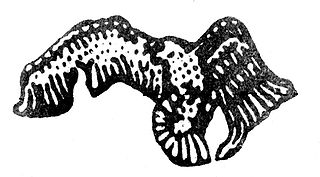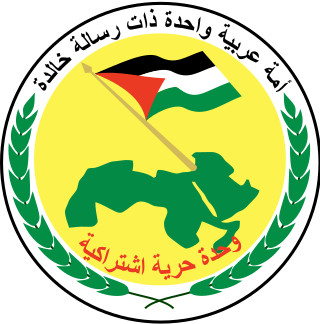Iraq is a federal parliamentary representative democratic republic. It is a multi-party system whereby the executive power is exercised by the Prime Minister of the Council of Ministers as the head of government, the President of Iraq as the head of state, and legislative power is vested in the Council of Representatives.

During the final decade of Ba'ath party rule, the politics of Syria took place in the framework of a presidential republic with nominal multi-party representation in People's Council under the Ba'athist-dominated National Progressive Front. In practice, Ba'athist Syria remained a one-party state where independent parties were outlawed, with a powerful secret police that cracked down on dissidents. From the 1963 seizure of power by its neo-Ba'athist Military Committee to the fall of the Assad regime, the Arab Socialist Ba'ath Party governed Syria as a totalitarian police state. After a period of intra-party strife, Hafez al-Assad gained control of the party following the 1970 coup d'état and his family dominated the country's politics.

The Arab Socialist Ba'ath Party, also transliterated as Ba'th, was a political party founded in Syria by Michel Aflaq, Salah al-Din al-Bitar, and associates of Zaki al-Arsuzi. The party espoused Ba'athism, which is an ideology mixing Arab nationalist, pan-Arab, Arab socialist, and anti-imperialist interests. Ba'athism calls for the unification of the Arab world into a single state. Its motto, "Unity, Freedom, Socialism", refers to Arab unity and freedom from non-Arab control and interference.

The National Iraqi Alliance, also known as the Watani List, was an Iraqi electoral coalition that contested the 2010 Iraqi legislative election. The Alliance was mainly composed of Shi'a Islamist parties. The alliance was created by the Supreme Council for Islamic Revolution in Iraq to contest in the January 2005 and December 2005 under the name United Iraqi Alliance, when it included all Iraq's major Shi'a parties. The United Iraqi Alliance won both those of elections however later fell apart after several major parties left the alliance due to disputes with Prime Minister Nouri al-Maliki and the Supreme Council.
The National Progressive Front was a state organised coalition of left-wing parties that supported the Arab nationalist and Arab socialist orientation of the now defunct Syrian Ba'athist regime and accepted the "leading role" of the ruling Syrian Ba'ath party. The coalition was modelled after the popular front system used in the Communist Bloc, through which Syrian Ba'ath party governed the country while permitting nominal participation of smaller, satellite parties. The NPF was part of Ba'ath party's efforts to expand its support base and neutralize prospects for any sustainable liberal or left-wing opposition, by instigating splits within independent leftist parties or repressing them.

The Iraqi Accord Front or Iraqi Accordance Front also known as Tawafuq is an Iraqi Sunni political coalition created on October 26, 2005 by the Iraqi Islamic Party to contest the December 2005 general election. As a large section of Iraq's Sunnis are composed by the populous Kurds, situated in northern Iraq and locally autonomous, the party's members are mostly Arab, and as such, its political efforts have largely been focused on protecting this community's interests as opposed to Iraq's non-Sunni population. In the 2005 election, its platform called for ending the US occupation of Iraq, revision of the new Iraqi constitution, repeal of the de-Ba'athification laws that had cost many Sunnis their government jobs and the restoration of the Iraqi Army, which was dissolved after the US overthrow of Saddam Hussein and which had a Sunni dominated officer corps. Despite this, the party has maintained that it is non-secular, even though the Ba'ath Party contained many prominent Sunnis.

Parliamentary elections were held in Iraq on 7 March 2010. The elections decided the 325 members of the Council of Representatives who would elect the prime minister and president. The elections resulted in a partial victory for the Iraqi National Movement, led by former Interim Prime Minister Ayad Allawi, which won 91 seats, making it the largest alliance in the Council. The State of Law Coalition, led by incumbent Prime Minister Nouri Al-Maliki, was the second largest grouping with 89 seats.

The State of Law Coalition, also known as Rule of Law Coalition, is an Iraqi political coalition formed for the 2009 Iraqi governorate elections by the Prime Minister of Iraq at the time, Nouri al-Maliki, of the Islamic Dawa Party.
De-Ba'athification refers to a policy undertaken in Iraq by the Coalition Provisional Authority (CPA) and subsequent Iraqi governments to remove the Ba'ath Party's influence in the new Iraqi political system after the U.S.-led invasion in 2003. It was considered by the CPA to be Ba'athist Iraq's equivalent to Nazi Germany's denazification after World War II. It was first outlined in CPA Order 1 which entered into force on 16 May 2003. The order declared that all public sector employees affiliated with the Ba'ath Party were to be removed from their positions and to be banned from any future employment in the public sector.
The National Progressive Front was an Iraqi popular front announced on 16 July 1973 and constituted in 1974, ostensibly formed within the framework of a "joint action programme" to establish a coalition between the Arab Socialist Ba'ath Party, the Iraqi Communist Party, the Kurdistan Revolutionary Party, a pro-government section of the Kurdistan Democratic Party, and miscellaneous independents. The Iraqi Communist Party were removed from the NPF in 1979 while the Kurdish Democratic Party suffered restrictions when Saddam Hussein came to power after 1979. The creation of the Front ensured the leading role of the Ba'athists in state and society whilst allowing limited autonomy for other participating parties loyal to the government. Saddam spoke of it once as "one of the essential forms to voice our will and to deepen democracy and political participation of the people and the national forces in building the new experiment in all fields." In effect the Front was controlled and maintained solely by the Ba'ath, with all other legal political forces acting in subservience to it.
Parliamentary elections were held in Iraq on 20 June 1980, the first since 1958. The elections were contested by around 860 candidates and saw the Ba'ath Party win 187 of the 250 seats. Voter turnout was approximately 80%.
Parliamentary elections were held in Iraq on 24 March 1996. The elections were contested by 689 candidates, although 30 MPs were appointed to represent Iraqi Kurdistan. The result was a victory for the Ba'ath Party, which won 161 of the 250 seats. Voter turnout was reported to be 93.5%.

The Arab Socialist Ba'ath Party, also referred to as the pro-Iraqi Ba'ath movement, is a Ba'athist political party which was headquartered in Baghdad, Iraq, until 2003. It is one of two parties which emerged from the 1966 split of the original Ba'ath Party.

The Arab Socialist Ba'ath Party, also referred to as the pro-Syrian Ba'ath movement, is a neo-Ba'athist political party with branches across the Arab world. From 1970 until 2000, the party was led by the Syrian president and Secretary General Hafez al-Assad. Until 26 October 2018, leadership was shared between his son Bashar al-Assad and Abdullah al-Ahmar.

The Socialist Arab Lebanon Vanguard Party is a political party in Lebanon. The party was led by Abd al-Majid al-Rafei until his death in July 2017. It is the Lebanese regional branch of the Iraqi-led Ba'ath Party. The party held its second congress in October 2011. Founders of the party included Dr. Abd al-Majid al-Rafe'ii, Jihad George Karam, Rafiq Naseeb al-Faqih,Rashid Abo Falah,Karam Mohamed al-Sahili, Hani Mohammad Sho'aib, Ammar Mohammad Shibli, Hassan Khalil Gharib and Wassef El Harakeh. Although formally affiliated to the Sunni-dominated regime in Baghdad, the majority of the party's members were Lebanese Shiites.

The National Vanguard Party, is an illegal political party in Mauritania. It is the Mauritanian regional branch of the Iraqi-led Arab Socialist Ba'ath Party.

The Ba'ath Brigades, also known as the Ba'ath Battalions, were a volunteer militia made up of Syrian Ba'ath Party members, almost entirely of Sunni Muslims from Syria and many Arab countries, loyal to the Syrian Government of Bashar al-Assad.
The Party of the Hungarian Interest, was a far-right Hungarian radical nationalist political party between 1993 and 2005.
Local elections were held across Syria on 16 September 2018 to elect 18,478 local council members in 88 electoral districts. More than 40,000 to 41,000 candidates contested the elections according to pro-government sources. The elections were the first held since the 2011 Syrian local elections and took place amid the Syrian civil war. The elections only took place in territories under the control of the Syrian government, with special constituencies set up for areas outside of government control.

Parliamentary elections were scheduled to be held in Syria on 13 April 2020 to elect members of the People's Council of Syria. However, on 14 March they were postponed to 20 May due to the coronavirus pandemic. On 7 May it was decided to postpone the elections until 19 July. Syria's parliamentary elections occur every four years, with the last held in 2016.











